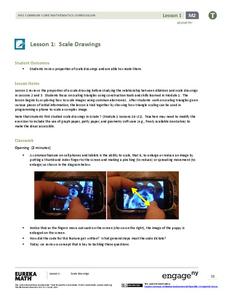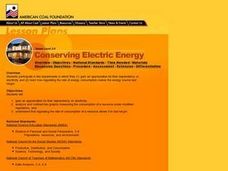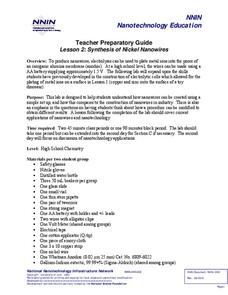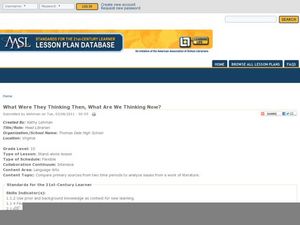Howard Hughes Medical Institute
Tracking Genetically Modified Mosquitoes
What's that buzzing in your ear? An insightful lesson about genetically modified mosquitoes! Partnered pupils explore the creation, release, and monitoring of mosquitoes designed to reduce the mosquito population. After watching a video,...
EngageNY
Margin of Error When Estimating a Population Proportion (part 1)
Use the power of mathematics to find the number of red chips in a bag — it's a little like magic! The activity asks learners to collect data to determine the percentage of red chips in a bag. They calculate the margin of error and...
EngageNY
Scale Drawings
Are you searching for a purpose for geometric constructions? Use an engaging approach to explore dilations. Scholars create dilations using a construction method of their choice. As they build their constructed dilation, they...
Curated OER
Comparing Roots After Rotation of Ninety Degrees
Students conduct an experiment and use different measurements of a single root to illustrate the mechanism of plant movement.
American Chemical Society
Dissolving an M&M
Here's a sweet lesson to explore solutes and solvents. Using candies and water, learners observe properties of parts of the solution as the candies dissolve. They then modify the setup and note variations in the solution.
Curated OER
Creepers and Climbers
Students compare vines. In this vines lesson, students analyze the adaptations common in vines. Students determine if the vine grows using tendrils, modified roots, or twining stems. Students explore a forest area to flag different vines...
101 Questions
Retina Display
Learners calculate the pixel density of a specific cell phone using the concept of similarity. They use information from the cell phone's website to make their calculations and then compare their results to the posted information.
Anglophone School District
Fluids: Force in Fluids
Discuss Archimedes' Principle and fluid forces with your young scientists as they describe the relationship between mass, volume, and density during a series of engaging activities. They use the Participle Theory of Matter to explore the...
Berkshire Museum
The Three Life-Giving Sisters: Plant Cultivation and Mohican Innovation
Children gain first-hand experience with Native American agriculture while investigating the life cycle of plants with this engaging experiment. Focusing on what the natives called the Three Sisters - corn, beans, and squash - young...
Curated OER
Classification and Attributes
Students classify objects based on their attributes. They explain how archaeologists use classification to help answer research questions.
Astronomical Society of the Pacific
Getting Ready for the All American Eclipse!
Give your pupils a front row seat at the biggest light show in the sky this year! In addition to admiring the total solar eclipse, young astronomers can explain the phenomenon with a little help from an inquiry-based instructional...
Curated OER
The Risks of Everyday Living
Students compare their perceptions of risk to the perceptions of scientists and risk professionals. in small groups, they evaluate risks on a scale of 1 to 10 for the average American on a yearly basis.
Curated OER
Conserving Electric Energy
Another fantastic lesson on energy is presented by the American Coal Foundation. This one focuses on electricity; how it is produced, how it is delivered, and how it is used. Some excellent handouts are embedded in this fine plan which...
Curated OER
Fun With Chemical Changes
Looking for a terrific chemistry lesson for your 5th graders? This one could be for you! After a teacher-led demonstration, learners are broken up into groups and perform an experiment using cabbage juice, water, window cleaner, and...
Achieve
False Positives
The test may say you have cancer, but sometimes the test is wrong. The provided task asks learners to analyze cancer statistics for a fictitious town. Given the rate of false positives, they interpret the meaning of this value in the...
Michigan State University
Gases Matter
Young scientists learn that seeing isn't necessarily believing when it comes to the states of matter. After performing a fun class demonstration that models the difference between solids, liquids, and gases, children complete a series of...
Curated OER
Science: Seed by Design
Young scholars, working in groups, create "artificial seeds" for a wind dispersal experiment. After trial runs, they redesign their seeds, and re-test them under the same conditions. Finally, they interpret, compare, and evaluate the...
Curated OER
What Is Special About Polyethylene Food Storage Bags?
Students participate in an investigation in which they compare a polyethylene bag designed for recycling or disposal with a polyethylene food storage bag. Students use hexane to determine the differences between the low density...
Intel
Play Ball!
Math and sports meet on the baseball diamond in the first STEM lesson in a series of six that asks pupils to collect and perform comparative analyses of data specific to baseball. Following the analysis, scholars create a presentation...
National Nanotechnology Infrastructure Network
Synthesis of Nickel Nanowires
It's all about the scale—they're not just wires, they're nanowires! The second lesson of the series builds on the oxidation-reduction experiment in the first lesson. Scholars synthesize a sample of nanowires using electrolysis. As they...
Curated OER
Gingerbread Baby v. Gingerbread Boy #7
Students compare and contrast the gingerbread baby in their story to the original gingerbread boy. They use a Venn diagram to easily see the similarities and differences.
Curated OER
Identifying Disease Genes using BLAST
Students navigate the National Center for Biological Information (NCBI) website and BLAST program to conduct a variety of biological assignments.
Curated OER
Moving West with the Forts: Using an Interactive Map
Seventh graders practice reading maps and locating the forts stationed in Texas. Using the internet, they analyze westward movements from statehood to the Civil War. In groups, they complete a worksheet about the forts and share their...
Curated OER
What Were They Thinking Then, What Are We Thinking Now?
Choosing an issue from a play or novel, researchers find two primary sources from different time periods to compare how people's views have changed. Many questions are listed to guide young writers. In the end, learners produce a...























